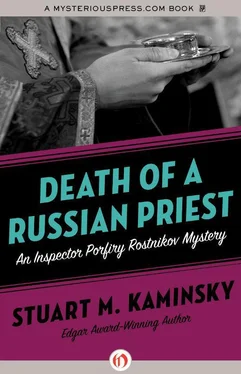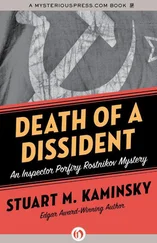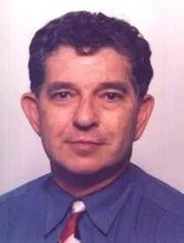Stuart Kaminsky - Death Of A Russian Priest
Здесь есть возможность читать онлайн «Stuart Kaminsky - Death Of A Russian Priest» весь текст электронной книги совершенно бесплатно (целиком полную версию без сокращений). В некоторых случаях можно слушать аудио, скачать через торрент в формате fb2 и присутствует краткое содержание. Год выпуска: 2012, Жанр: Полицейский детектив, на английском языке. Описание произведения, (предисловие) а так же отзывы посетителей доступны на портале библиотеки ЛибКат.
- Название:Death Of A Russian Priest
- Автор:
- Жанр:
- Год:2012
- ISBN:нет данных
- Рейтинг книги:3 / 5. Голосов: 1
-
Избранное:Добавить в избранное
- Отзывы:
-
Ваша оценка:
- 60
- 1
- 2
- 3
- 4
- 5
Death Of A Russian Priest: краткое содержание, описание и аннотация
Предлагаем к чтению аннотацию, описание, краткое содержание или предисловие (зависит от того, что написал сам автор книги «Death Of A Russian Priest»). Если вы не нашли необходимую информацию о книге — напишите в комментариях, мы постараемся отыскать её.
Death Of A Russian Priest — читать онлайн бесплатно полную книгу (весь текст) целиком
Ниже представлен текст книги, разбитый по страницам. Система сохранения места последней прочитанной страницы, позволяет с удобством читать онлайн бесплатно книгу «Death Of A Russian Priest», без необходимости каждый раз заново искать на чём Вы остановились. Поставьте закладку, и сможете в любой момент перейти на страницу, на которой закончили чтение.
Интервал:
Закладка:
“I understood, I’m not a fool,” Peotor Merhum shot back.
“Gentlemen, gentlemen,” the mayor said nervously. “We are on the street. People can …Let’s go inside, inside.”
They made their way through the first door to an overly warm room furnished with a table and seven chairs. The room looked and smelled like Communist party meeting halls Rostnikov had been in from Yalta to Siberia.
Everyone but Emil Karpo hung his coat on a rack just inside the door. On the table, the kind that folds in the middle and has black painted legs, were cups and a plate of large pyeechyeh’yah, cookies. They all sat down, and an old woman and a boy who must have been watching from another room came hurrying in with boiling pots of tea.
The walk from the station had not been terribly long, but after the train ride in which Rostnikov had moved very little, the distance had taken a toll on his leg. He resisted the urge to massage it.
Rostnikov looked at the blond boy who served the tea. Normally children and adults found it difficult to keep from looking at Emil Karpo. This boy, however, was watching Peotor Merhum with a mixture of emotions that Rostnikov had difficulty reading-fear, concern, grief. Peotor Merhum did not look up.
“We have prepared rooms for you here in the hall,” Petrov said. “I’m certain you will find them comfortable. There is no hotel in town. It is said that Trotsky spent two nights here.”
“A comforting thought,” said Rostnikov, accepting a cookie from the plate offered to him by Misha Gonsk, who then took three for himself.
“Given the madness of our times,” said Petrov, “it may well be that Trotsky will soon be reinstated as a hero of the early revolution, his picture on walls. We are in need of new gods now that the old ones have been broken.”
“I’ve had nothing to eat all day,” Gonsk jumped in. “Much too busy with the … I’ll take you to the scene of the … whenever you like.”
“Inspector Karpo will be remaining here overnight. I must get back to Moscow. You will take him to the location of the crime and I will remain here and talk to each of you individually.”
The cookies were good, and Rostnikov had two more. The conversation ceased for a few minutes, except for requests to pass the teapot, until it was revived by Rostnikov.
“There are a few others I would also like to talk to. Is there another priest in town?”
“Not on a regular basis,” Misha Gonsk said quickly, “but since Father Merhum was so well known, many priests, especially young ones, came from time to time. There are quite a few here now, for the funeral services. And the bishop. Did we mention the bishop?”
“I mentioned the bishop,” the mayor said with obvious irritation.
“Yes,” said Rostnikov.
“And there are newspaper reporters. Pravda itself,” Gonsk said.
“And,” the mayor added with undisguised pride, “a television crew from the nine o’clock news, ‘Vremya.’”
Karpo, who had taken neither tea nor cookies, was taking notes.
“Perhaps we will talk to one or two of them later. And the nun, Sister …?”
“Nina,” said the mayor, who started to cross himself, looked around the table, and stopped with his hand almost to his heart. The hand went quickly to his lap.
“I should like to see her. And anyone in the town named Oleg.”
“Yes,” said Gonsk, coming to life. “I anticipated this request. We have seven Olegs. One of them is four months old. Another is six. Six years. His father … but that is not important. That leaves five, including Oleg Boshisi, who is possibly the oldest-no, the second oldest person in town. Oleg is ninety-one. Dlyana Gremonovaya is ninety-four. The other three are Oleg Brotsch, the baker. He baked these cookies-”
“Very tasty,” said Rostnikov.
“Uh, and then,” Gonsk went on, squinting at a crumpled piece of paper he had extracted from his pocket. The paper looked like the torn corner of a newspaper. “Then, let me see …”
“Oleg Brotsch’s son, who is also Oleg. He is fifteen,” said Petrov, his hands folded on the table.
“Sixteen,” Gonsk countered.
“Sixteen,” Petrov responded. “I am corrected. He is sixteen and feebleminded. He needs his mother’s help to fart.”
“Oleg Grogaiganov is some kind of businessman. He travels.”
“Is he in Arkush now?”
“Yes.”
“And the last Oleg?” Rostnikov added.
“Oleg Pninov,” said Misha Gonsk, returning the paper to his pocket.
“Pninov is the last of a proud line,” Peotor Merhum said. “Town drunks running back for generations. We have several town drunks and a trio of village idiots, though some would say we have even more. Inbreeding does it.”
“We will talk to them all,” said Rostnikov, without looking at Peotor Merhum.
“Even the baby and the child?” asked Gonsk.
“Their parents.”
“The father, the baby’s father, is in Siberia. He’s an engineer working on-” Gonsk said.
“Use your good judgment, comrade,” Rostnikov said. “And one more request, please turn the heat down in this room. Now, if we are finished with this welcome refreshment, I would like to talk to Inspector Karpo privately for a few moments.”
The murderer rose with the others, looked at Rostnikov, and started for the door. It had gone reasonably well. He could think of no error he had made that would give him away. He had played his part with the skill bred of years of practice.
He would watch, listen, and be prepared to act if the two from Moscow began to approach the truth. How he would act was not yet certain, but he had killed once. It could be no harder a second time.
It is illegal to beg in Moscow, but in the subway stations one frequently encounters ragged Gypsy children with their heads almost shorn and their hands out in supplication. They furrow their young brows in transparent mock agony, which covers a bravado beneath which is the real layer of agony.
The Gypsy children, usually carrying even smaller Gypsy children, made Sasha Tkach uneasy. Most Muscovites simply pretended they were not there, though occasionally an older man or woman would scold the begging children. Sasha vacillated between giving them a few kopeks and striding past them as if they did not exist. It depended on his mood. Today his mood was running wild. He handed a little girl a ten-kopek coin and plunged his hands into his pockets.
“We’ll take the purple line to the Dzerzhinsky station and then the red line to Universitet,” he said.
“The green line to Marx Prospekt is faster,” Elena said, “more direct.”
“You are not in charge,” he said as people flowed around them. “I am in charge. I am the senior officer.” He tapped his chest and looked in her eyes.
“The green line is faster,” Elena said. “But suit yourself.”
Sasha looked at the people flowing by, a pair of sailors, shoppers with half-full bags, a mother and child, hand in hand, each eating something that might have been a cucumber. “All right, the green line,” he said softly. “It is a small issue. When a big one comes, we do as I say.”
Elena shook her head. This was her fifth day with this madman. She was not sure she could tolerate another, but what recourse did she have? To complain about her partner after less than a week? It was difficult enough being one of the few women in investigation without being one who immediately complained. Short of physical abuse, she would have to tolerate this sexist.
It was midafternoon when they reached the fifteen-story apartment building on Lomonosov Prospekt behind Moscow State University. A police van was parked outside with its light flashing. No one was inside the van and there was no large crowd of the curious, though passersby did glance toward the nearby doorway and into the empty cab of the van.
Читать дальшеИнтервал:
Закладка:
Похожие книги на «Death Of A Russian Priest»
Представляем Вашему вниманию похожие книги на «Death Of A Russian Priest» списком для выбора. Мы отобрали схожую по названию и смыслу литературу в надежде предоставить читателям больше вариантов отыскать новые, интересные, ещё непрочитанные произведения.
Обсуждение, отзывы о книге «Death Of A Russian Priest» и просто собственные мнения читателей. Оставьте ваши комментарии, напишите, что Вы думаете о произведении, его смысле или главных героях. Укажите что конкретно понравилось, а что нет, и почему Вы так считаете.












